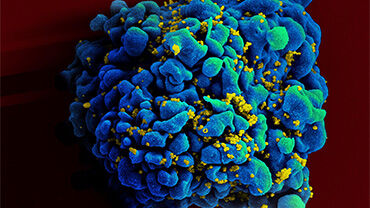Preventing HIV and STI among men who have sex with men – an ECDC guidance
Men who have sex with men (MSM) are the only key population in the countries of the European Union and European Economic Area that has not seen a decline in new HIV infections during the last decade. In its new guidance, ECDC identifies key services to reduce and prevent HIV and other sexually transmitted infections (STI) among MSM. These scientifically proven interventions range from vaccination, better access to testing and condoms to timely treatment and targeted health promotion. For maximum effect, these are best applied in combination.
“Interventions to prevent HIV and STI transmission in men who have sex with men have been available in Europe for a long time. But implementation and the coverage of services often do not meet policy goals. The ECDC guidance specifically addresses the needs for this group and summarises those interventions that have proven to work: from vaccination, better access to testing and condoms to timely treatment of those who are infected”, says ECDC Acting Director Andrea Ammon. Sex between men is still the predominant mode of HIV transmission (42%) in the EU/EEA and reported cases among MSM have increased by 33% compared to 2004i. In addition, the majority (58%) of all new syphilis cases in the EU/EEA in 2013 were reported among MSMii.
Vytenis Andriukaitis, European Commissioner for Health and Food Safety said: "Men who have sex with men are the main risk group in the EU's policy framework addressing HIV/AIDS. With new infections still increasing in this group, I very much welcome the guidance published by ECDC today. Identifying means of prevention is essential, along with reducing the stigma of HIV in general and amongst MSM in particular. This scientifically proven guidance complements actions undertaken by the Union through the Health Programme, and I hope that Member States make good use of this evidence to halt the spread of HIV/AIDS.”
“No single intervention outlined in our guidance will significantly reduce HIV or STI transmission on its own of course. Needs and preferences vary across and within country settings, by individual and over time. To improve the sexual health among men who have sex with men in Europe, we need to target our efforts and tailor them to the national or local situation. Ideally, even with the involvement of those we are targeting”, says Ammon.
In the guidance HIV and STI prevention among men who have sex with men, ECDC explores good public health practices that can effectively prevent infections among MSM and also includes reference to the needs of MSM who are living with HIV. Common blood-borne viruses in this group include HIV and hepatitis B. Prevention services for MSM should be targeted following the analysis of relevant and reliable epidemiological data, so that services are directed at the appropriate scale to those geographical and risk populations most at-risk of HIV and STI infection.
As many countries in Europe experience constrained public health budgets, it is more important than ever to implement targeted and evidence-based measures that address the groups most at-risk.
ENDS
NOTES TO EDITORS
The ECDC guidance outlines seven suggested interventions:
Vaccinations: Promote and deliver vaccination to protect against hepatitis A and B. Consider vaccination for human papilloma virus (HPV).
Condoms: Provide easily accessible condoms and condom-compatible lubricants and promote their effective use.
HIV and STI testing: Provide voluntary and confidential HIV and STI counselling and testing via a variety of modalities that are easy to access for the target group. Voluntary partner referral can support the early diagnosis and treatment of contacts.
Treatment: Timely provision of treatment for HIV, viral hepatitis and STI should be ensured. Preventive benefits of treatment are significant.
Health promotion: Provide accurate and accessible information that enables men to understand and assess sexual health-related risks and prevention efficacy, and that promotes awareness of one’s own HIV and STI status.
MSM-competent health services: MSM-competent points of care offering a comprehensive sexual health programme including health promotion, counselling, peer support, prevention, adequate diagnostics and treatment will increase service uptake. Ensure target group involvement and training for providers on how to offer comprehensive care for MSM.
Targeted care for MSM living with HIV: Provide antiretroviral treatment for HIV and vaccination; regular STI screening using adequate diagnostics; treatment for STIs; individual counselling, sexual health promotion and peer-support groups for men living with HIV.
CONTACT
ECDC press office
- Tel.: +46 (0) 8 58 60 16 78
- Email: press@ecdc.europa.eu







